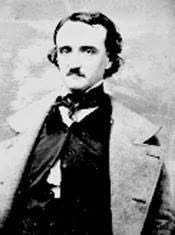LITR 4232 American
Renaissance

Edgar Allan Poe. Introduction & poetry.
|
midterm update 2nd half of course Poe: poetry: Josh Hughey "Annabel Lee": Alicia Atwood stories: Natalie Walker Poe, Hawthorne as "Byronic Hero"
|
 |
Tuesday, 28 October: Edgar Allan Poe 1528: Introduction; “Sonnet—To Science”; "To Helen" 1534-6: “The City in the Sea”; 1542: “Annabel Lee.”
Text-Objective Discussion: Josh Hughey (poem[s] besides "Annabel Lee")
Text-Objective Discussion: Alicia D. Atwood ("Annabel Lee")
Thursday, 30 October: Poe's fiction 1543-1565: “Ligeia”; “The Fall of the House of Usher”
Text-Objective Discussion: Natalie Walker
Tuesday, 4 November: Nathaniel Hawthorne, 1272-76 introduction + 1311-20: “The Minister’s Black Veil.”
Web highlight (final exams on gothic with Hawthorne or Poe): Cheryl Romig
Thursday, 6 November: Hawthorne continued 1289-98: “Young Goodman Brown.”
Text-Objective Discussion: Veronica Nadalin
Course
Objectives:
1. To use "close reading" and "Historicism" as ways of studying classic, popular, and representative literature and cultural history of the "American Renaissance" (the generation before the Civil War).
2.
To study the movement of "Romanticism,"
the narrative genre of
"romance," and the related styles of the "gothic" and "the
sublime." (The American Renaissance is the major period of American Romantic
Literature.)
Related topics or themes: the
Byronic hero;
correspondence
3. To use literature as a basis for discussing representative problems and subjects of American culture (Historicism), such as equality (race, gender, class); modernization and tradition; the individual, family; and community; nature; the role of writers in an anti-intellectual society.
midterm update
about half of midterms have come in
Won't start reading until weekend
Saturday: talk downtown on Dogs of the American Indians
Jamestown Society, First Texas Chapter
Will try to return midterms by two weekends from now
2nd half of course--still same period (1830s-1850s) but slightly different style of class
two ways to organize a course like this—
thematic organization (e. g., first half of class: extension of Revolutionary rights to women and slaves; development of romance, gothic, and sublime)
"Greatest Hits" approach--Focus on great writers one at a time
thematic organization
organize writers around a common theme, and see how each author contributes
*advantage: one class feeds into the next, strong focus on what one is looking for when reading
*disadvantage: reductive? + students often don’t catch theme, just know whether they like today’s reading assignment or not
"Greatest Hits" approach--Focus on great writers one at a time
this second way is more like a hit parade or a highlight film approach, where there’s less a central theme than a hopping from one great author to another
and look for opportunistic groupings:
E. g., Poe > Hawthorne
assignments for this and next week
2 great fiction writers—Poe & Hawthorne
2 “Byronic heroes” in image, behavior
2 additional types of American gothic
themes / topics for Poe (both days)
Poe as "catalogue of romanticism"
problem of separating Poe's life from Poe's literature
theme of love and loss in both life and literature
Romance narrative: Desire and loss
Gothic + European
Poe's life--what's Romantic, what's not?
Poe as "Byronic" figure typical of Romantic era--?
Style: Musicality--among most "musical" of poets; compare Tennyson
Hawthorne assignments
Compare and contrast Poe and Hawthorne
Both use gothic for psychological purposes
Poe as popular, Hawthorne as classical, elite writer
Poe influences more lurid tradition, sensations, surrealism, etc.
Hawthorne more intellectual, lofty, serious, yet elusive, delicate; anticipates Henry James
How does Hawthorne anticipate modern literature?
Ambiguity, perspective
+ compare gothics:
Hawthorne: "moral gothic" of light and dark, good and evil
Moral, not moralizing—less absolute right and wrong than exploration of subject, intermingling of good and evil in human reality—x-unlike other men; > “all have sinned” 2208-09
Puritans as gothic--past, guilt / sin, darkness & light
But also wilderness gothic: forest in Young Goodman Brown
Poe
as unique writer
"Insane drug addict"
>unlucky, hardworking alcoholic
constant "rewriting" of Poe's life
2387 influences, contributions by Poe
loss of beautiful woman
Poe
as catalogue of American Romanticism
gothic
"European" gothic
2387 England in 1815
+ psychology
"orientalism"--tendency to romanticize "oriental" images in Romantic art and literature as "exotic," etc. "The Orient" in the nineteenth century included the Middle East as well as eastern Asia.
arabesque: a kind of ornamentation consisting of a fantastic interlacing pattern of flowers, foliage, or fruit, often with figures of men and animals (except in Arabic art), sometimes geometic in character
2388 Tales of the Grotesque and Arabesque
desire and loss
"Romance" 2458
"Annabel Lee" 2473-4
Check out Poe's play on "desire and loss" in "Ligeia"
2387 mistake “I” in narratives as Poe himself
"Sonnet--to Science"
dull realities x romance
disenchantment of nature
leisure
"The City in the Sea"
time-eaten towers = gothic structure
nothing that is ours
cf House of Usher: problem of action: things fall apart
"Annabel Lee"
small world; kingdom -- cf enlightened democracy; family romance
child
gothic conclusion -- cf Minister's Black Veil
Notes from Previous Classes
Midterms
Grades overall were good, classic bell curve as long as you're working from C-B-A instead of F-D-C-B-A
If you want an anonymous breakdown of the class's overall midterm grades, email
If dissatisfied or concerned about Individual grades, here are some options:
· Review note, try to absorb instead of resisting analysis
· Review in Writing Center--appointments with peer counselors--sometimes easier to absorb suggestions from a peer than from a senior faculty member
· Welcome to review with prof:
reply by email,
talk by phone,
confer after class or in office (Office hours T, Th 1-2, Th 5-6)
Advice on talking with instructors about grades: Don't start by telling instructor he's obviously wrong and unfair. Ask how your work can improve.
· Sample midterms on webpage